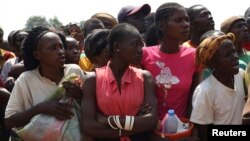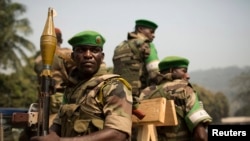The number of people displaced in the troubled Central African Republic has topped 1 million, as the country's humanitarian crisis grows deeper.
The United Nations refugee agency said Monday that more than 950,000 people were displaced within the CAR, while another 86,000 have fled to neighboring countries.
VOA reporter Nick Long is in the CAR capital, Bangui. He said that according to a report from the U.N. humanitarian agency, living conditions for most of the country's people were growing desperate.
"A great majority of communities are reporting that the number of meals people eat every day has dropped from three to one. Everywhere people have lost their livelihoods, and everywhere people are saying they don't have enough seeds for the next planting season. And there's a lack of clean drinking water everywhere," he said.
Long said the U.N. report detailed especially bad conditions inside the displaced persons' camps.
"It describes them as horrendous, with an average of up to 4,000 people per latrine at some of the biggest camps. So that just gives you an idea of the scale of the challenge that aid workers and indeed everybody faces," he said.
Long said Bangui appeared calm Monday after unrest and looting over the weekend. The Red Cross reported treating 60 people for wounds since Friday at the city's main hospital.
Interim CAR President Michel Djotodia resigned Friday, after months of deadly violence, much of it involving Muslims and Christian militia groups.
On Sunday, transitional leader Alexandre Nguendet appealed for calm while political leaders begin to work out a path toward new elections.
Nguendet and parliament may begin the process of selecting a new transitional president as early as Tuesday.
The CAR has a long history of unrest since winning independence from France in 1960.
The latest crisis began after mostly Muslim Seleka rebels overthrew President Francois Bozize last March. Abuses by the rebels triggered the rise of Christian defense groups and a cycle of killings and violence.
Deployments of French and African troops have not been able to stop the violence, which has left more than 1,000 people dead.
The United Nations refugee agency said Monday that more than 950,000 people were displaced within the CAR, while another 86,000 have fled to neighboring countries.
VOA reporter Nick Long is in the CAR capital, Bangui. He said that according to a report from the U.N. humanitarian agency, living conditions for most of the country's people were growing desperate.
"A great majority of communities are reporting that the number of meals people eat every day has dropped from three to one. Everywhere people have lost their livelihoods, and everywhere people are saying they don't have enough seeds for the next planting season. And there's a lack of clean drinking water everywhere," he said.
Long said the U.N. report detailed especially bad conditions inside the displaced persons' camps.
"It describes them as horrendous, with an average of up to 4,000 people per latrine at some of the biggest camps. So that just gives you an idea of the scale of the challenge that aid workers and indeed everybody faces," he said.
Long said Bangui appeared calm Monday after unrest and looting over the weekend. The Red Cross reported treating 60 people for wounds since Friday at the city's main hospital.
Interim CAR President Michel Djotodia resigned Friday, after months of deadly violence, much of it involving Muslims and Christian militia groups.
On Sunday, transitional leader Alexandre Nguendet appealed for calm while political leaders begin to work out a path toward new elections.
Nguendet and parliament may begin the process of selecting a new transitional president as early as Tuesday.
The CAR has a long history of unrest since winning independence from France in 1960.
The latest crisis began after mostly Muslim Seleka rebels overthrew President Francois Bozize last March. Abuses by the rebels triggered the rise of Christian defense groups and a cycle of killings and violence.
Deployments of French and African troops have not been able to stop the violence, which has left more than 1,000 people dead.






